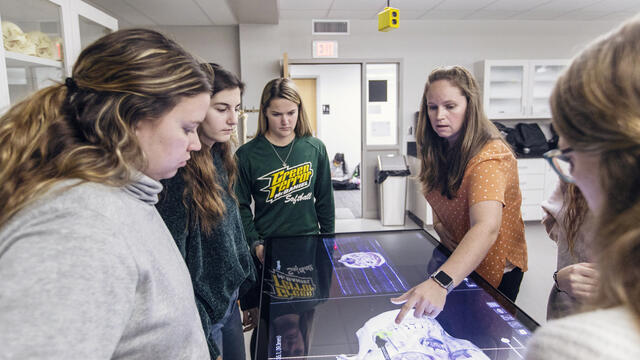Four unique interdisciplinary programs at McDaniel College
The liberal arts at McDaniel make interdisciplinary studies achievable for students. But what is an interdisciplinary program? What do interdisciplinary studies look like? Learn about just four programs that build unique pathways for Green Terrors: Food Studies, Africana Studies, Actuarial Science, and Kinesiology.

McDaniel College offers interdisciplinary programs that provide customizable pathways for students as part of the McDaniel Commitment. Here, Professor Jennifer McKenzie works with students in the Kinesiology labs on campus.
As a liberal arts college, McDaniel supports students as they study at the intersections of their passions, no matter how different the disciplines may seem. With unique, interdisciplinary major and minor combinations and a Design Your Own option, McDaniel graduates enter into fields that they are uniquely prepared for.
What is an interdisciplinary program? It’s a course of study that integrates multiple subject areas to provide an education that is both well-rounded and focused.
Interdisciplinary knowledge is something that careers like conflict resolution counselor, entertainment lawyer, or art conservator have in common. Their awareness of topics across the board allows them to find a niche in the market, innovate, and perform their roles to the max.
While a liberal arts curriculum and the McDaniel Commitment offer avenues for tailor-made education, McDaniel offers a few programs that exist at the crossroads of traditional subject areas.
- Here are just four of the interdisciplinary programs at McDaniel:

- Food Studies (major, minor)
- Learn more about the degree in Food Studies
- Coordinator: Mo Esa
- What is Food Studies? It’s McDaniel’s newest major in a growing field. Food is a core part of the human experience, but not all humans experience it the same way. Through literature, social studies, science, data analysis, hands-on gardening, and historical perspectives, Food Studies students delve into the subject from all angles. It’s not only multidisciplinary, but also cross-cultural. That’s why this program is easily combined with other majors and minors, to prepare students for careers involving something we all love: food.
- Careers for Food Studies majors include:
- Food scientists or technologists
- Chefs, bakers, and pastry artists
- Public health specialists
- Hospitality and restaurant managers
- Agriculture or food science technicians
- Sustainability consultants
- Restaurant publicists
- Nutritionists
- Food batchmakers
- Culinary journalists
- Africana Studies (minor)
- Learn more about the minor in Africana Studies
- Coordinator: Linda L. Semu
- Africana Studies guides students through the history, heritage, and cultures of African-origin peoples around the world — including in the U.S. In courses like Black Music: Slave Songs to Rap, students become a scholar of both history and contemporary culture.
- “Students have the option to take courses that focus on cultural, economic, historical, political, psychological and sociological issues affecting people of African descent and the African Diaspora from comparative and multidisciplinary perspectives,” says Linda Semu, professor of Sociology and coordinator for the African Studies program.
- “Africana Studies encompasses varied approaches to such topics as Diaspora Studies; culture, religion, music and art; women, gender and sexuality; health; politics; and social and economic policy,” Semu says. “The field is pliable in its ability to shift focus in response to demographic shifts within the Black population in the U.S. This has mostly been the case following the post-1970s rise of mass incarceration, as well as the growth of immigrants from Continental Africa, the Caribbean, and Latin America.”
Careers fields related to Africana Studies:
- Medicine and health
- Journalism
- Nonprofit organizations
- Law
- Social work
- Education
- Civil Service Work
- Public Affairs and Policy
- Actuarial Science (major)
- Learn more about the Actuarial Science major
- Coordinator: Spencer Hamblen
- For the everyday person, risk assessment is paired with instinct and personal experience. For professional risk-assessors, aka actuaries, there’s a science to it. The Actuarial Science major exists at the intersection of mathematics, statistics, and business. Many private and government fields need help analyzing financial risk, so McDaniel graduates can find careers that match their every interest. Faculty and alumni also provide guidance on the extensive exams that actuaries-to-be must pass to qualify for industry positions.
Careers for Actuarial Science majors include:
- Life or health insurance actuary
- Property and casualty insurance actuary
- Enterprise risk management actuary
- Pension and retirement benefits actuary
- Public sector actuary
- Insurance agent
- Mathematician
- Statistician

IMPRESSIVE OUTCOMES Alayna Meekins ’22
Alayna Meekins graduated from McDaniel College as the first student to hold a degree in Actuarial Science. A dual major in Economics, Meekins kept an eye on the future while pursuing her ideal career as an actuary. Support from professors and alums alike helped set her up for success, and her plans aren't over yet.
- Kinesiology (major, minor)
- Learn more about the Kinesiology program
- Department Chair: Richard Laird
- Kinesiology delves into how the human body works, but it also touches on topics in medical care, gender, performance, and more. Jennifer McKenzie ’01, associate professor of Kinesiology, says Kinesiology is an interdisciplinary field that draws on many of the traditional liberal arts, like biology, history, philosophy, and sociology.
- “At McDaniel, we approach Kinesiology in this interdisciplinary way,” McKenzie says. “Our faculty bring real-world experience into the classrooms and labs and always put out students first. The new Kinesiology labs and classrooms are a bonus!”
- Jessica Ford, an assistant professor of Kinesiology, says, “There are tons of opportunities for students to get real-world experience that mirrors the roles and responsibilities within their careers post-graduation. Almost every Kinesiology student graduates with at least one internship, practicum, or independent study.
- “Our students get a lot of individualized attention and guidance from faculty. Due to the rigor of the coursework and the various opportunities for hands-on learning, the Kinesiology department has an outstanding track record of students getting into graduate programs with focuses in athletic training, physical therapy, physical education, and more.”

Where You'll Study Kinesiology’s new labs and classrooms open in Gill Center Dynamic Facilities
The newly renovated Gill Center bustles with activity. After all, this is the epicenter of McDaniel’s study of movement — the place Kinesiology students and faculty alike call home. Three classrooms, three labs, nine faculty offices and a seminar room were newly built inside Gill Center to support a program that prepares students for careers as health professionals, coaches, athletic trainers, physical education teachers, personal trainers and others whose work centers on the science of physical activity and movement.